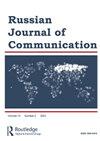简介:俄罗斯传媒体系正处于十字路口
Q1 Social Sciences
引用次数: 3
摘要
本期特刊及时地反思了目前正处于十字路口的俄罗斯媒体体系。在这篇引言中,我们简要概述了前苏联时代俄罗斯媒体的理论,并指出它们似乎是一波三折的。在我们看来,第一波浪潮与1991年苏联解体后对改革的“开放”和戏剧性变化的分析有关。这一浪潮之后,人们试图反思2000年代中期前后的全国性媒体进程。第三波浪潮与2010年代的监管变化相吻合,并受到影响媒体行业的显著技术变革和该国互联网普及率不断提高的影响。这篇专题文章可能会引发新的概念化浪潮,因为它重新审视了之前关于俄罗斯媒体体系内在二元性的断言。本期特刊的五篇文章以这样或那样的方式提出,这种二元论构成了俄罗斯媒体特有的持久性。作者反思了现有媒体理论在俄罗斯语境中的适用性,并对俄罗斯不同的新闻实践、地区差异和融合的媒体子系统提供了最新的描述。本文章由计算机程序翻译,如有差异,请以英文原文为准。
Introduction: the Russian media system at a crossroads
ABSTRACT This special issue provides a timely reflection on the Russian media system, which is currently at a crossroads. In this introduction, we provide a brief overview of previous theorisations of the post-Soviet Russian media and suggest that they seemingly go in waves. The first wave, to our mind, is linked to the analysis of the perestroika’s ‘Glasnost’ and the dramatic shifts following the dissolution of the Soviet Union in 1991. This wave is followed by an attempt to reflect on the nationwide processes of media around the mid-2000s. The third wave coincides with the regulatory changes in 2010s and is informed by the pronounced technological changes affecting media industries and growing Internet penetration in the country. This special issue potentially feeds into a new wave of conceptualisation, as it revisits previous assertions of the inherent duality of the Russian media system. The five articles contributing to this special issue in one way or another argue that this dualism constitute the characteristic enduring nature of the Russia media. The authors reflect on the applicability of existing media theories to Russian context as well as offer an up-to-date account of diverse journalist practices, regional differences and converging media sub-systems in Russia.
求助全文
通过发布文献求助,成功后即可免费获取论文全文。
去求助
来源期刊

Russian Journal of Communication
Social Sciences-Political Science and International Relations
自引率
0.00%
发文量
0
期刊介绍:
Russian Journal of Communication (RJC) is an international peer-reviewed academic publication devoted to studies of communication in, with, and about Russia and Russian-speaking communities around the world. RJC welcomes both humanistic and social scientific scholarly approaches to communication, which is broadly construed to include mediated information as well as face-to-face interactions. RJC seeks papers and book reviews on topics including philosophy of communication, traditional and new media, film, literature, rhetoric, journalism, information-communication technologies, cultural practices, organizational and group dynamics, interpersonal communication, communication in instructional contexts, advertising, public relations, political campaigns, legal proceedings, environmental and health matters, and communication policy.
 求助内容:
求助内容: 应助结果提醒方式:
应助结果提醒方式:


